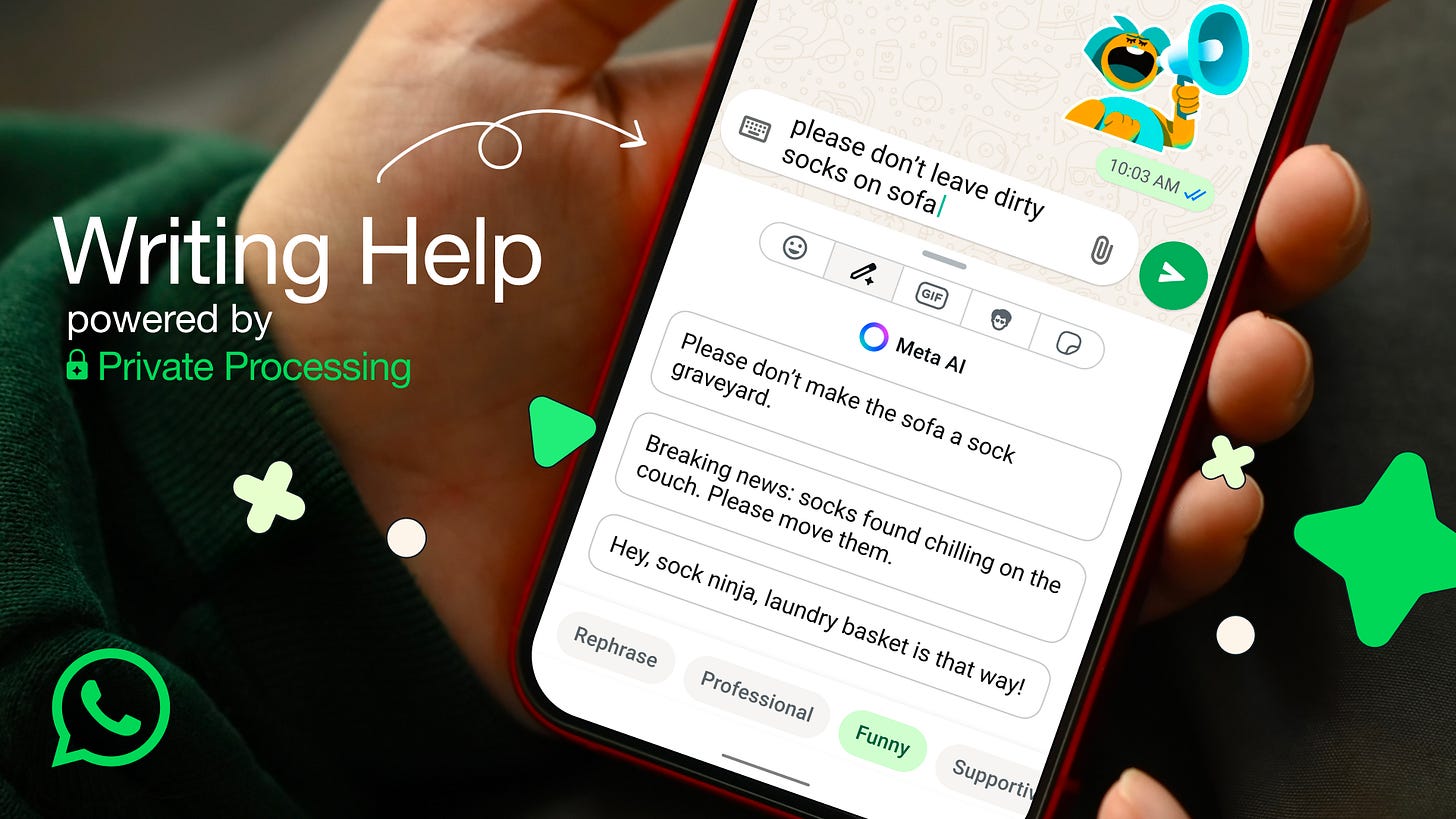AI has entered the chat, literally
AI could help you write that difficult text – but should you let it?
There’s AI slop. Then there’s AI cringe.
It’s what happens when you turn to a chatbot for help asking your roommate to pick up their dirty socks, and get this:
“Hey, sock ninja, the laundry basket is that way!”
A line like that has all the contrived enthusiasm of a dead-eyed camp counsellor who’s been working one summer too many, but just won’t move on.
At the end of August, Meta-owned messaging platform WhatsApp introduced an AI-driven feature called Writing Help, which supplies texters with possible responses to messages in a handful of styles, including professional, supportive and funny.
“Sometimes you know what you want to say, but just need a little help with how to say it,” the blog post said.
Sure. But there’s not a soul in my contacts list who would use the phrase “sock ninja.” I’d like to think no reasonable human would.
As companies rush to stuff AI into their products, WhatsApp is only the latest platform to make such an integration. Google Gemini already refines your emails, if you want. You don’t even need a devoted feature – just pull up ChatGPT whenever there’s something you need to say that you don’t know how to say on your own.
While these types of AI tools might seem like a welcome escape hatch when times get awkward or uncomfortable, they’re also another way in which tech inserts itself into our relationships – and maybe even shelters us from doing the good work of thinking and communicating.
The AI ick
Tales of suspected AI use during sensitive communications are popping up all over the internet.
Over the summer, a Redditor posed the question, “Did my mother use ChatGPT to write me a text of support on the morning of my divorce?” A screenshot of the text included such pearls as “Today is a turning point — one that leads you toward more peace, healing, and happiness.”
The Redditor wrote, “It still just makes me feel weird.”
Just a few weeks ago, “The Cut” ran a lengthy story chronicling how AI is making online dating somehow even worse, telling stories of daters who quickly realized they were having full conversations with other daters hiding behind ChatGPT.
ARE THE FISH PICS EVEN REAL ANYMORE??
There’s actually a name for what’s happening in these instances: AI-mediated communication. It’s the idea that now, between us and other people, there’s a layer of AI.
“It affects things, but how it affects is different, weird, varied,” said Dominic DiFranzo, assistant professor of computer science and engineering at Lehigh University, where he studies human-computer interaction.
Even before ChatGPT burst onto the scene nearly three years ago, researchers like DiFranzo started studying the effect of AI on communication.
In 2023, DiFranzo and others published a study looking at how smart replies changed the way people not only interacted with each other, but also perceived each other. To be fair, there were actually some benefits to using the smart replies – communication got speedier, more positive in tone and conversational partners tended to view each other as more cooperative.
What was also clear from the study was that when people suspected the person they were communicating with was using AI, they didn’t like it, and evaluated them negatively – even if they weren’t using the smart replies.
It gave people the ick. DiFranzo said there are a few reasons that might be the case.
For one, there’s a transparency issue. Discomfort peaks when people think there’s a chance AI was involved, but they don’t know for sure.
In a similar 2019 study from Cornell University and Stanford University, researchers showed participants Airbnb listings created by humans, AI or a mix of the two. When participants weren’t sure which was which, they distrusted the ones they thought might be AI more.
There’s also the perception that using AI to craft a message is impersonal, which isn’t even really an issue exclusive to AI. I’m old enough to remember people complaining that e-cards just weren’t the same as receiving a card in the mail. Certain communication methods seem low on both effort and care.
It’s not just about the energy expenditure of driving to the post office to buy a stamp. There are privacy concerns, too.
In other words: Did you really just upload the gnarly details of my divorce into an LLM?
“There’s now a third party involved in this relationship or communication. We might not have felt that in the same way before,” DiFranzo said.
The subtext of texting
Technology has been worming its way into our communications for much longer than the last three years.
The study of computer-mediated communication (CMC) dates back to the 1980s and covers everything from the bulletin board systems of yore to social media.
“It’s not explicitly the technology,” DiFranzo said, “It’s how we’re using it, what our expectations are, how these different social norms are created, how they’re adapted, how they’re enforced and captured by people.” It’s also how they get reinforced and change over time.
Whether you’re conscious of it or not, you probably don’t text the same way you email. Your texts are probably less formal, and you might respond faster.
And you probably don’t text the same way you did when you first got a cellphone.
In high school 20 years ago, we debated whether it was OK for someone to ask you out via text. It was a resounding NOPE from me.
Years later, I heard someone make an argument for dating sites, saying they leveled the playing field for folks who didn’t have the immediate charm and obvious good looks to approach strangers and nab numbers in the wild.
A moment of silence for those with no game.
All of that speaks to DiFranzo’s point that this field is always evolving. Maybe one day, all this fretting about the value of writing your own texts might not seem so important.
Writing as thinking
Unless you’re a diehard AI fan, it’s easy for conversations about the technology to veer into the fear of loss.
You can look at AI writing help as a gift for when your own abilities fall short – or another wave eroding the experience of being a human among humans.
We crave authenticity and intimacy. But we’re also attracted to the promise of a frictionless life.
It’s hard to know what to say to a friend who has lost a parent. I’ve sat staring into the middle distance more than a few times, struggling to come up with something that would serve as even the briefest of balms.
I’d argue, though, there is value in trying to connect with that person, in peeking into the corners of your own empathy in hopes of turning up a few good words.
We crave authenticity and intimacy. But we’re also attracted to the promise of a frictionless life.
Even if there’s no tragedy or strife to contend with, the practice of writing is important for our brains.
“You’re clarifying your thoughts,” DiFranzo said.
Journalist Derek Thompson conveyed a similar sentiment in a Substack post this week, called “The End of Thinking.”
“The demise of writing matters, because writing is not a second thing that happens after thinking. The act of writing is an act of thinking,” Thompson said.
Beyond the loss of critical thought, I imagine a world where everyone’s AI helpers talk to each other for everything, like some dark twist on the old “have your people call my people” joke. It’s a future where social distancing never really ended.
When to stop generating
To be sure, there are likely situations where having AI crank out some communication is fine. My dermatologist was jazzed about using ChatGPT for insurance pre-authorization letters. I don’t fault him for that.
Surely, there’s room for balance – maybe a suggested phrase or two spurs an idea of your own.
The answer to how far to go in using AI in personal communications might be as simple as this: “If you wouldn’t like AI messages from others, maybe you second-guess yourself. The Golden Rule should always apply,” DiFranzo said.
If you’re super keen on using AI responses, maybe it’s worth asking your friends and family how they feel about them. Establish some rules and guidelines.
For example, please never let AI call me a sock ninja.
Features like AI writing help come at a time when it’s increasingly tempting to outsource… everything. Once again, we’re faced with deciding what is actually worth our time and attention.
Not only that, but when and how we choose to move through the world without an insulating barrier of AI around us.
Chatbot cringe is everywhere, but as DiFranzo put it: “Even if your voice or your writing isn’t good, it’s still you.”
This month’s (P)doom: < 8%.
– Erin






This is such fertile ground for a nuanced conversation! A few things that popped out at me:
- Writing *is* thinking <-- yes, this, so much this! It's wild the number of times I've sat down to write about something, not really knowing how I felt about it, then in the practice of vomiting words out on the page, I stumble upon my thesis in the last paragraph of that first draft.
- Should we reject convenience? Is a friction-free world actually making us happier? The cat is out of the bag in many ways, but I mull over this a lot. A convenient, frictionless environment certainly makes for great consumers, but does it have a negative impact on our resilience? Our curiosity? I would argue yes. But of course there are degrees. Let's not eliminate washing machines, but maybe next-day, contactless Amazon delivery with free shipping is not the best thing for net human happiness.
- Why would I want to read something no one bothered to write? I'm in this weird place; I don't want to be Cicero, shaking his fist at punctuation, but it seems like there are concrete reasons other than discomfort with change for not wanting people to chat with other humans using AI, and I think the line for me is level of (or intended level of) intimacy in the relationship. Writing to your insurance company? Sure, whatever, knock yourself out. Sending a message to someone you want to make friends with/date? Why would you outsource that? And anyway what are you gonna do in a face-to-face convo? We're so obsessed with "perfection" when messy-but-more-honest is going to be more sustainable in the long run.